Introduction
CRM (Customer Relationship Managements) has become one of the most crowded software categories. Every platform promises to organize contacts, track leads, and grow sales but when you’re faced with dozens of options, the question quickly becomes: which is the best CRM for small business in 2026?
That’s the question this guide answers. We’ll cut through the noise to highlight the platforms that are actually built for smaller teams: affordable, easy to use, and effective without endless setup.
Inside, you’ll find a breakdown of what small businesses should look for in a CRM, the top tools to consider this year, and practical guidance to choose the one that fits your goals.
Key Takeaways
- The best CRM for small business in 2026 balances affordability, simplicity, and essential features not bloated enterprise tools.
- HubSpot, Zoho, Freshsales, Pipedrive, and Capsule stand out as top options built with smaller teams in mind.
- Free plans can be a strong starting point, but paid tiers often deliver more time-saving features that quickly justify the cost.
- Choosing the right CRM means focusing on ease of use, integrations with everyday tools, and scalability as your business grows.
- A well-chosen CRM helps small businesses replace scattered spreadsheets with a system that saves time, improves follow-ups, and supports steady growth.
Disclaimer: I am an independent Affiliate. The opinions expressed here are my own and are not official statements. If you follow a link and make a purchase, I may earn a commission.
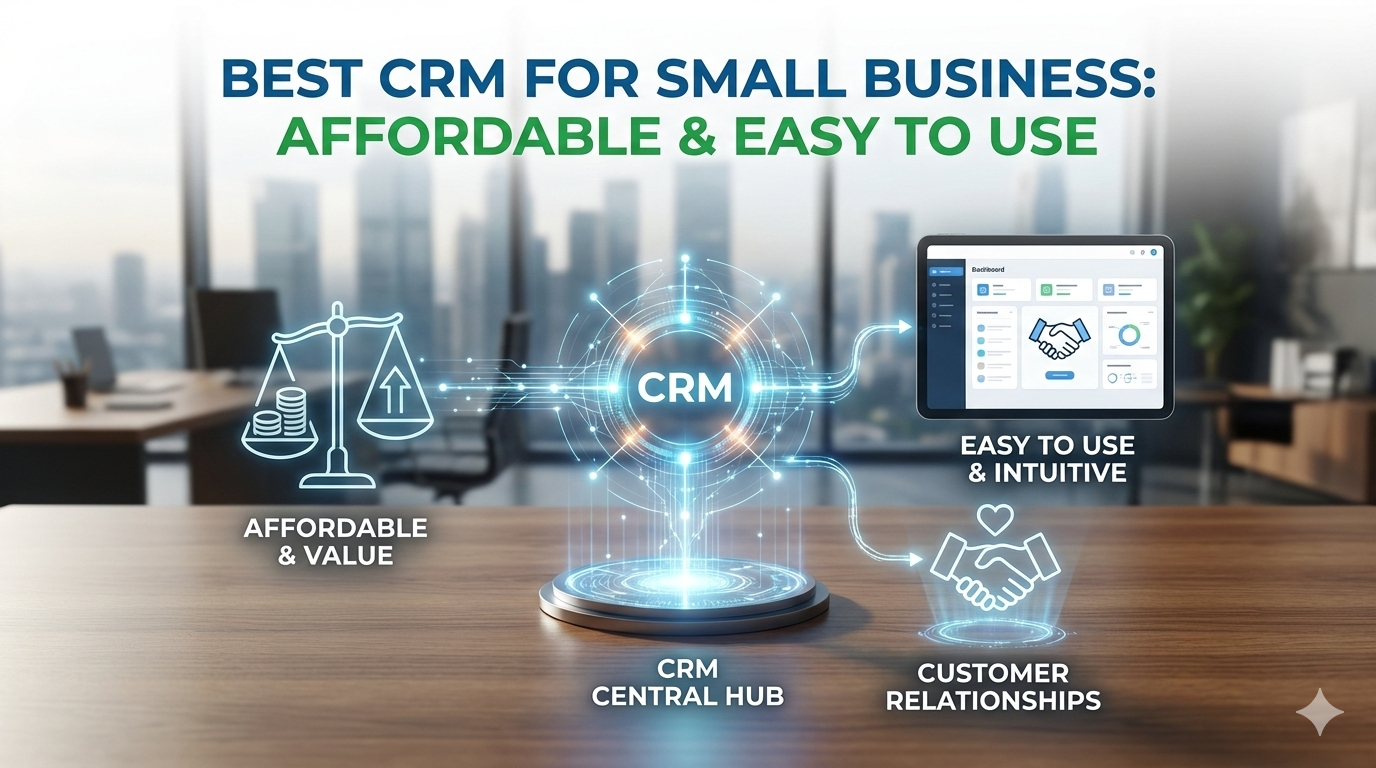
What Small Businesses Need in a CRM
Small businesses don’t need the most advanced or expensive CRM on the market. They need a system that solves everyday challenges without adding unnecessary complexity. The right tool makes it easier to stay organized, follow up consistently, and get a clear view of what drives growth.
Here are the priorities that matter most when evaluating a CRM for small business in 2025:
- Affordability: A CRM should fit a small business budget. Free tiers or low-cost plans are valuable starting points, but the best options also scale affordably as the business grows.
- Ease of Use: A tool that requires weeks of training or a dedicated IT team isn’t realistic for small businesses. The best CRMs are intuitive, quick to set up, and easy for everyone on the team to adopt.
- Essential Features, Not Bloat: Contact management, email integration, and simple automation are non-negotiables. Advanced enterprise features are less important and often just add cost and complexity.
- Integrations with Everyday Tools: A good small business CRM should connect with email, invoicing software, calendars, and website forms to keep all data in one place.
- Room to Grow: Even small businesses need a system that can scale. A CRM should start simple but allow for more features as the company expands.
These criteria set the stage for identifying which platforms truly work best for smaller teams in 2026.
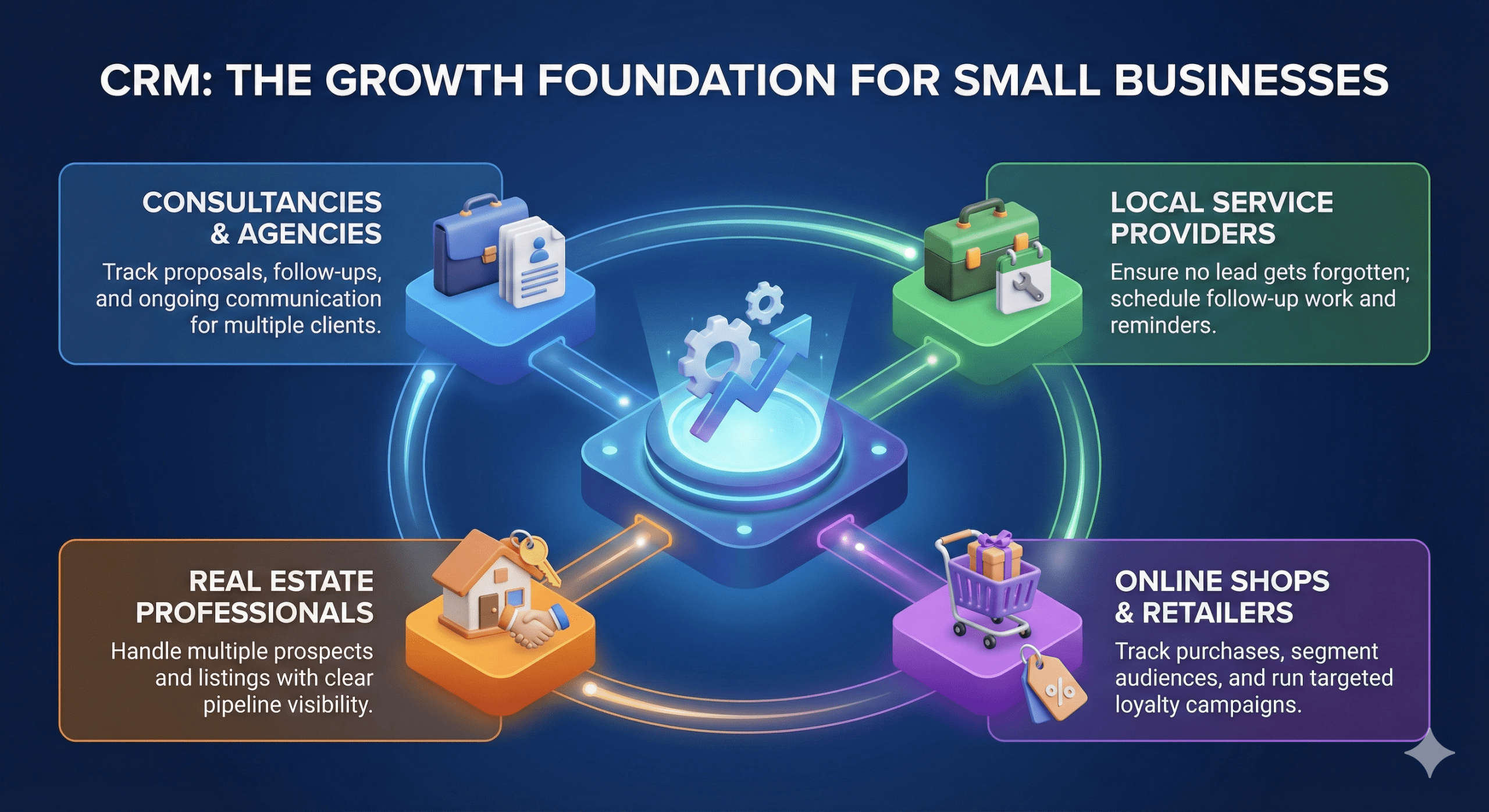
What Type of Small Business Needs a CRM?
CRMs aren’t built just for large corporations. In fact, some of the businesses that see the fastest impact are small companies where every customer counts and every follow-up matters.
Here are the types of small businesses that benefit most from adopting a CRM:
- Consultancies and Agencies: Whether it’s a marketing agency or a freelance consultancy, managing multiple clients and prospects quickly becomes overwhelming without a system. A CRM makes it simple to track proposals, follow-ups, and ongoing communication in one place.
- Local Service Providers: From plumbers to cleaning companies, service-based businesses thrive on repeat customers and referrals. A CRM ensures no lead gets forgotten and makes it easier to schedule reminders for follow-up work or seasonal promotions.
- Online Shops and Small Retailers: E-commerce and boutique shops use CRMs to track customer purchases, segment audiences, and run targeted campaigns that turn one-time buyers into loyal customers.
- Real Estate Professionals: Small real estate offices often handle dozens of prospects, listings, and deals at once. A CRM provides visibility into the pipeline so opportunities don’t slip through the cracks.
For small businesses that rely on steady leads, organized communication, and repeat customers, a CRM isn’t just a nice tool it’s the foundation for consistent growth.
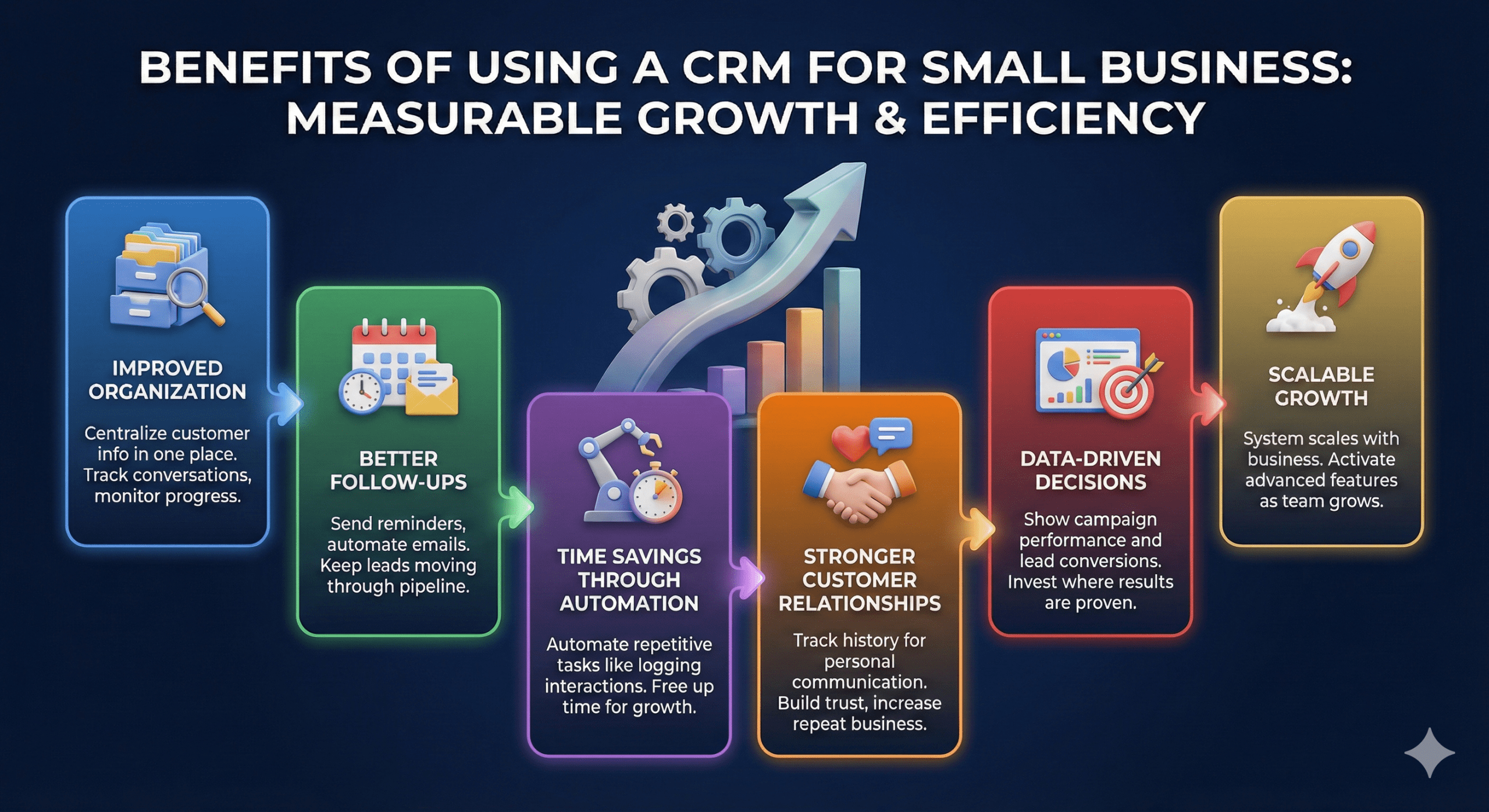
Benefits of Using a CRM for Small Business
For many small businesses, the idea of adding yet another tool feels unnecessary until they see the difference a CRM makes. The right system doesn’t just store customer information; it changes how owners and teams manage daily work, interact with customers, and plan for growth.
Here’s what a CRM can do for small businesses in 2026:
- Improved Organization: Customer information often lives across emails, spreadsheets, and sticky notes. A CRM brings everything together in one place, making it simple to track conversations, monitor progress, and ensure no detail gets lost.
- Better Follow-Ups: Missed follow-ups cost sales. CRMs send reminders, automate emails, and keep leads moving through the pipeline. Small businesses can give every prospect consistent attention, even with limited staff.
- Time Savings Through Automation: Repetitive tasks like logging interactions, sending confirmations, or updating records can be automated. For a small team, those hours add up freeing owners to focus on service and growth instead of admin work.
- Stronger Customer Relationships: A CRM tracks history with each customer, so communication feels personal instead of generic. That personal touch builds trust, increases repeat business, and turns satisfied customers into long-term supporters.
- Data-Driven Decisions: Guessing what works is risky when budgets are tight. CRM dashboards show which marketing campaigns perform best, which leads convert, and where customers are dropping off. Small businesses gain clarity to invest where results are proven.
- Scalable Growth: Even if a business starts small, a CRM scales with it. As the team grows, more advanced features can be activated without switching platforms or starting from scratch.
These benefits explain why CRMs have become one of the most valuable tools for small businesses. With the right system in place, owners trade chaos for clarity, missed chances for reliable follow-ups, and guesswork for measurable growth.
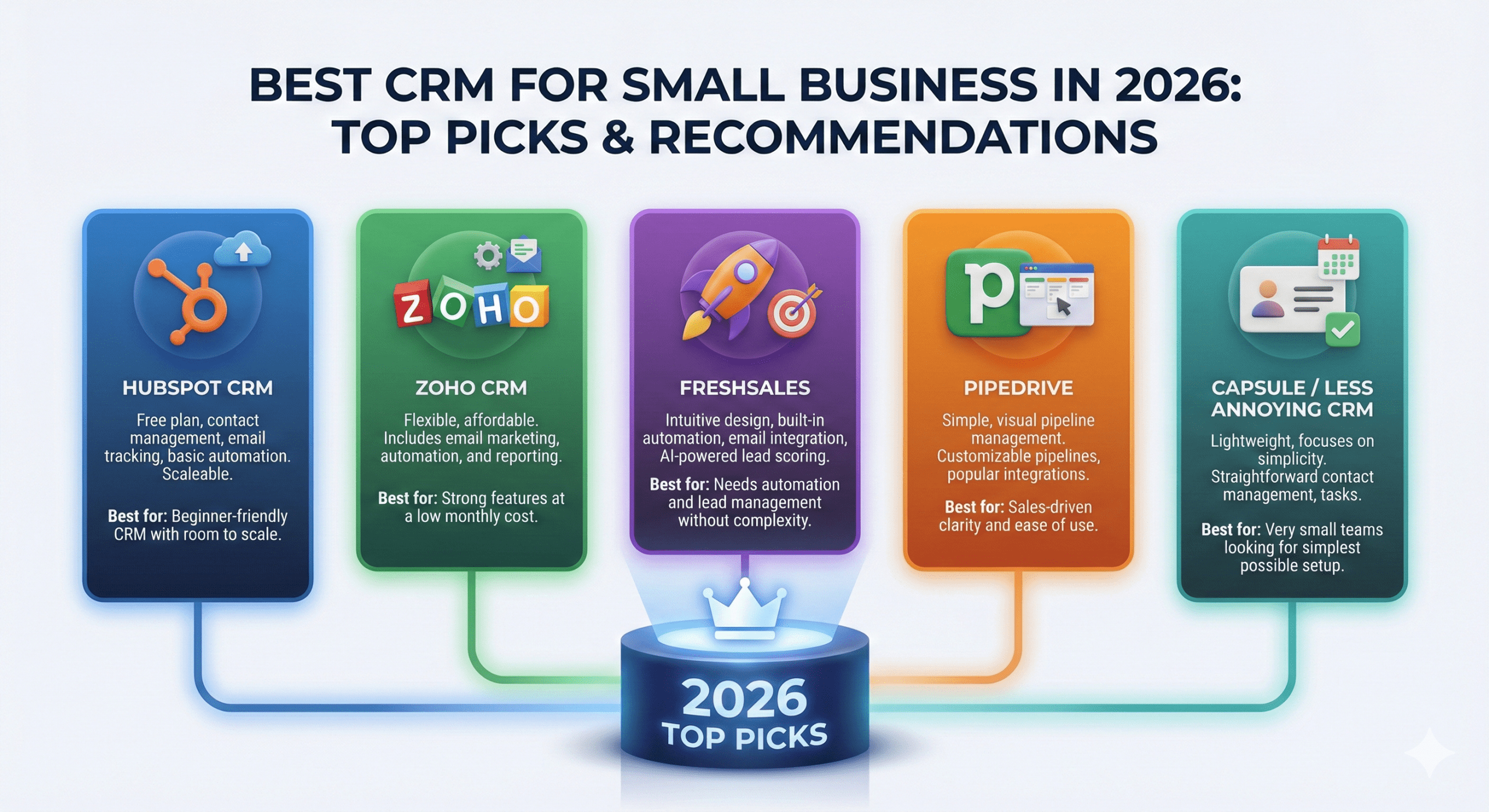
Best CRM for Small Business in 2026: Top Picks
Dozens of CRMs compete for attention, but only a few truly fit the needs of small businesses. Here are the leading options for 2026, chosen for their balance of price, usability, and features that matter most to smaller teams.
HubSpot CRM
HubSpot remains one of the most popular CRMs for small businesses thanks to its free plan and easy onboarding. It includes contact management, email tracking, pipeline management, and basic automation. As needs grow, businesses can upgrade into paid marketing and sales hubs.
- Best for: Small businesses wanting a free, beginner-friendly CRM with room to scale.
Zoho CRM
Zoho offers a flexible, affordable system that works well for businesses ready to move beyond spreadsheets. With email marketing, automation, and reporting tools included in its entry-level plans, Zoho gives small teams powerful features without a steep learning curve.
- Best for: Businesses wanting strong features at a low monthly cost.
Freshsales
Freshsales combines intuitive design with built-in automation, email integration, and AI-powered lead scoring. It’s designed to help small teams manage pipelines efficiently and close deals faster.
- Best for: Small businesses that need automation and lead management without complexity.
Pipedrive
Pipedrive is known for its simple, visual approach to pipeline management. Small businesses benefit from its drag-and-drop interface, customizable pipelines, and integrations with popular marketing tools.
- Best for: Sales-driven small businesses that want clarity and ease of use.
Capsule CRM (or Less Annoying CRM)
These lightweight CRMs are built specifically for small businesses. They focus on simplicity, with straightforward contact management, tasks, and basic integrations, no bloat, just the essentials.
- Best for: Very small teams looking for the simplest possible CRM setup.
Quick Comparison of the Best CRMs for Small Business in 2026
| CRM Tool | Best For | Key Features | Starting Price* |
|---|---|---|---|
| HubSpot CRM | Free starter CRM with high-growth potential | Contact management, email tracking, pipeline management, basic automation, meetings, live chat, forms. | Free (paid upgrades start at ~$20/user/month) |
| Zoho CRM | Affordable all-in-one for small teams | Sales automation (workflows, lead scoring), robust reporting, analytics (Zia AI assistant), email marketing, deep integrations. | ~$14/user/month (billed annually) |
| Freshsales | Sales automation and AI lead management | Visual pipelines, built-in automation, AI lead scoring, marketing automation, built-in phone and email. | ~$9/user/month (billed annually) |
| Pipedrive | Sales-driven small businesses | Visual pipelines with drag-and-drop, deal management, activity tracking, integrations, AI features for lead qualification. | ~$14/user/month (billed annually) |
| Capsule / Less Annoying CRM | Very small teams needing simplicity | Capsule: Simple contact management, sales pipelines, task management. Less Annoying CRM: A single, straightforward price with all features included. | Capsule: Free for up to 2 users, paid plans start at ~$18/user/month. Less Annoying CRM: ~$15/user/month |
*Prices are approximate starting points as of late 2025 and may vary by plan, billing cycle, and company needs.
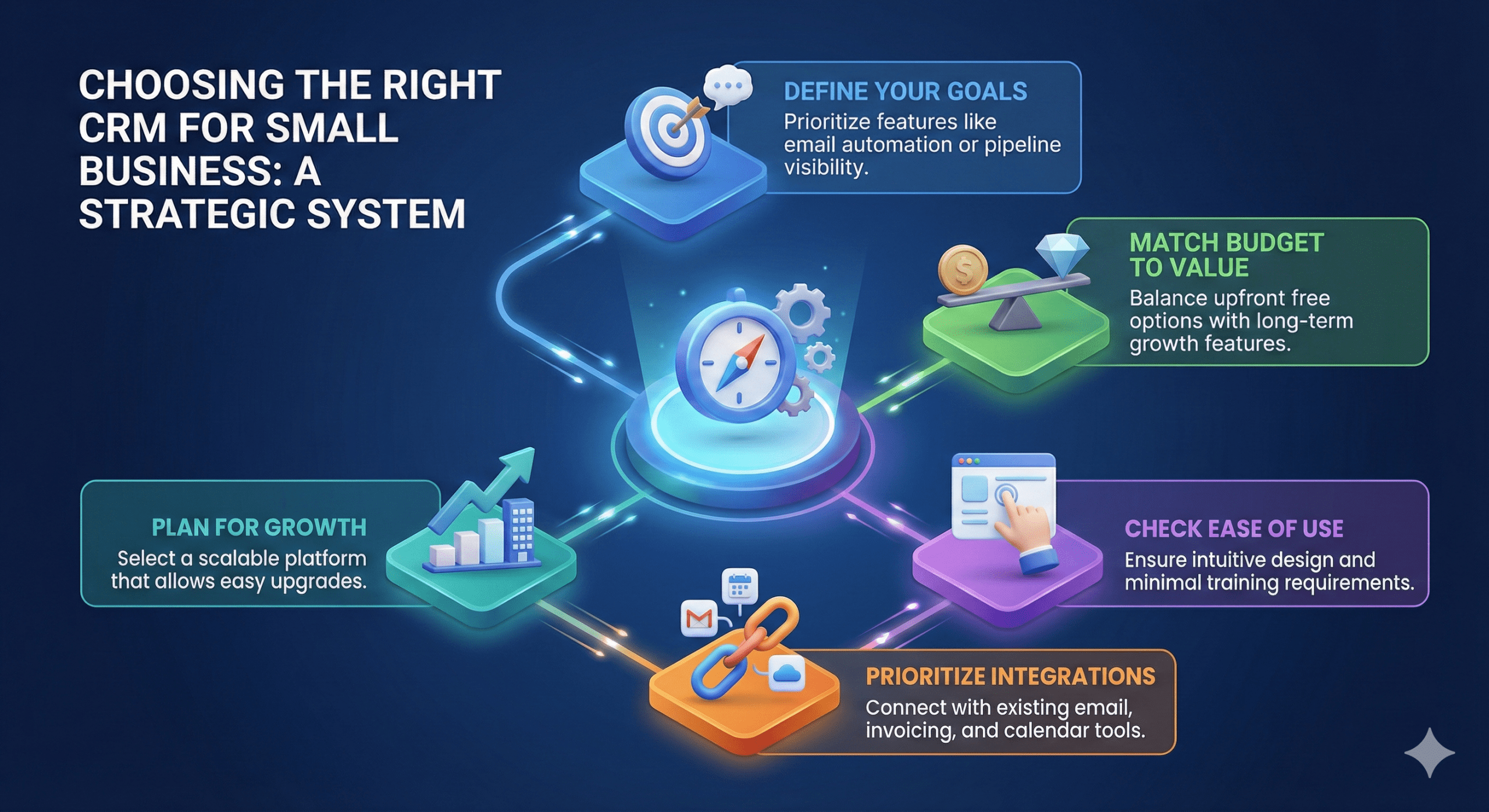
How to Choose the Right Small Business CRM
The best CRM for small business isn’t the one with the longest feature list, it’s the one that fits your workflow, your budget, and your goals. With so many platforms competing for attention, here’s how to narrow the field and make the right choice.
- Define Your Goals
Start with what matters most. If your priority is email campaigns, choose a CRM with strong email marketing and automation. If pipeline visibility is the main need, look for clean, customizable pipeline tools. - Match Budget to Value
Free CRMs are great for starting out, but think about growth. Paying a modest monthly fee may unlock features that save you hours every week. Balance upfront cost with long-term value. - Check Ease of Use
The best CRM for small business is the one your team will actually use. Look for intuitive design, simple onboarding, and minimal training requirements. - Prioritize Integrations
Choose a system that connects easily with tools you already use email, invoicing, calendars, and website forms. Integrations prevent double work and keep data in sync. - Plan for Growth
Even if your needs are simple today, make sure the platform you choose has the ability to scale. Adding features later should feel like an upgrade, not a complete restart.
By evaluating CRMs with these factors in mind, small business owners can move past the noise and pick a system that supports growth instead of slowing it down.

How To Use CRMs to Grow a Small Business
A CRM is more than a database, it’s a tool small businesses can use to streamline everyday operations and improve results. Here are a few practical ways owners and teams apply CRM software:
Email Marketing Campaigns
Instead of sending the same email to everyone, a CRM allows small businesses to segment contacts and personalize outreach. A local service company, for example, can target past customers with seasonal promotions, increasing repeat business without extra effort.
Simple Sales Pipelines
A clear pipeline helps small teams see where every lead stands. A boutique agency might use drag-and-drop stages in their CRM to track inquiries from first contact to signed contract, ensuring no opportunity gets lost.
Customer Retention and Repeat Sales
CRMs keep detailed customer histories. An online retailer can use this data to remind customers when it’s time to reorder or suggest complementary products, boosting retention and lifetime value.
Task and Follow-Up Management
Small businesses often struggle with forgotten follow-ups. A CRM can assign reminders, automate task lists, and ensure consistent communication turning potential missed deals into closed ones.
These use cases show how the right CRM doesn’t just store contacts. It creates structure, saves time, and helps small businesses grow steadily without adding more staff.
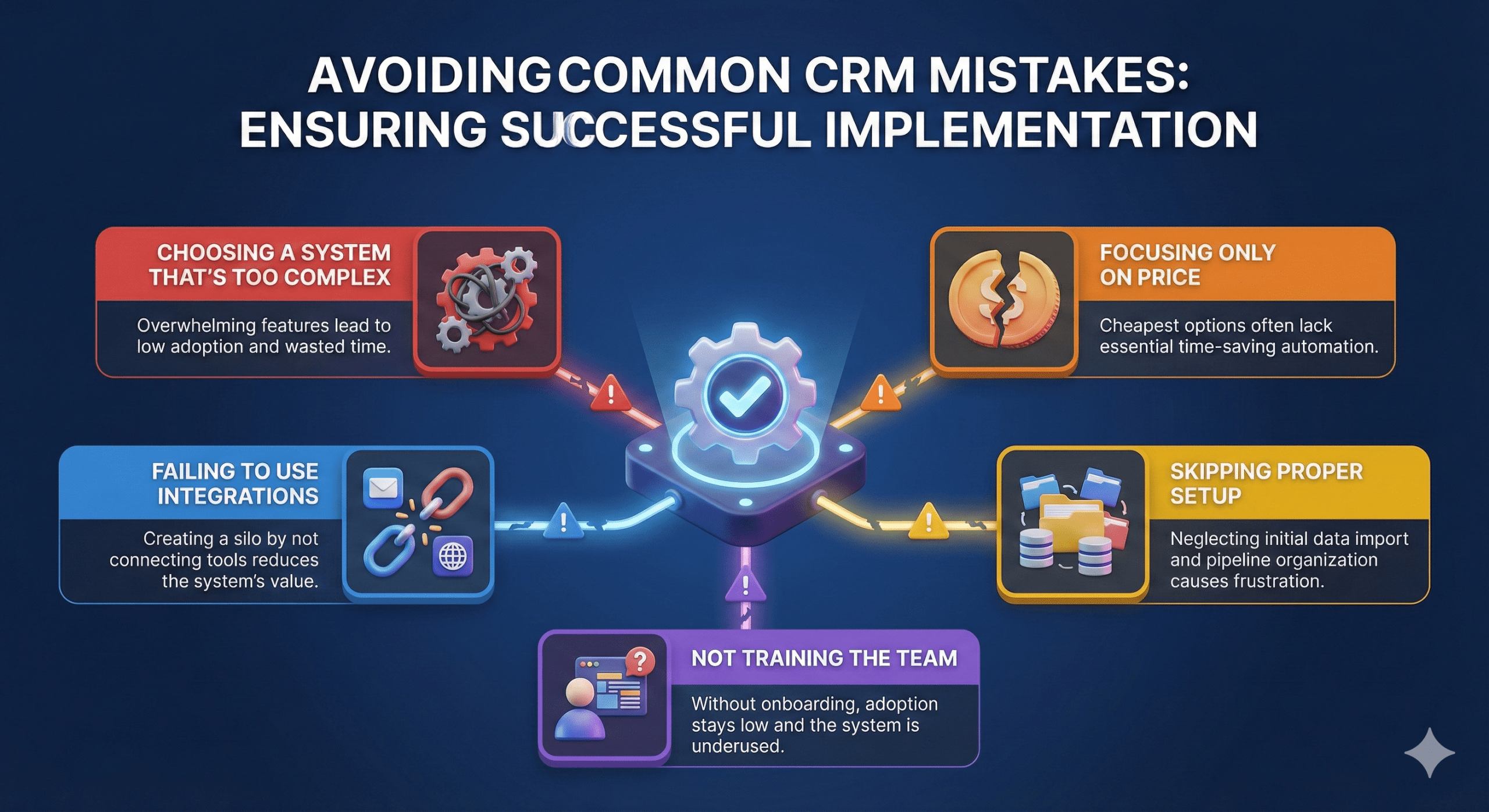
Common Mistakes Small Businesses Make With CRMs
A CRM can transform the way a small business operates, but only if it’s used correctly. Too often, businesses invest in a system that ends up underused or abandoned.
Here are the most common mistakes to avoid:
- Choosing a System That’s Too Complex
Enterprise-level CRMs may look impressive, but for a small business they can be overwhelming. Complexity leads to wasted time and low adoption. - Focusing Only on Price
Free sounds great, but the cheapest option isn’t always the best. Sometimes paying a small monthly fee unlocks automation or integrations that save hours every week. - Skipping Proper Setup
A CRM needs initial organization: importing clean data, setting up pipelines, and integrating email. Skipping this step often leads to frustration later. - Not Training the Team
Even the simplest CRM requires some onboarding. Without basic training, adoption stays low and the system never reaches its potential. - Failing to Use Integrations
A CRM that isn’t connected to email, invoicing, or your website is just another silo. Not using integrations reduces the value of the tool.
By avoiding these pitfalls, small businesses can make sure their CRM investment pays off with a system that supports growth instead of creating more headaches.

Conclusion
The best CRM for small business in 2026 isn’t about having every feature possible. It’s about finding a tool that’s affordable, easy to use, and powerful enough to keep customers organized and growth on track.
From free starter options like HubSpot to budget-friendly systems like Zoho, Freshsales, and Pipedrive, small businesses now have reliable choices that fit lean teams and tight budgets. The key is focusing on what matters: simplicity, integrations with the tools you already use, and the ability to scale as your business grows.
With the right CRM in place, small businesses can replace scattered spreadsheets and missed follow-ups with a streamlined system that saves time, improves customer relationships, and supports sustainable growth.
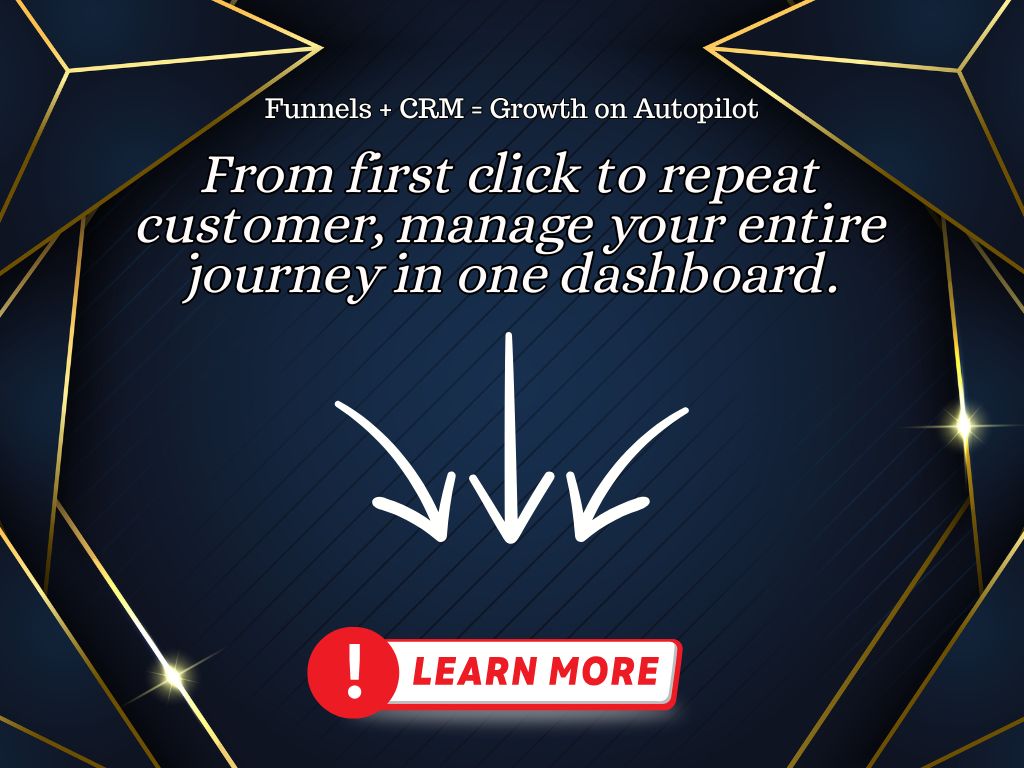
FAQs About CRM for Small Business
Do small businesses really need a CRM?
Yes. Even small teams benefit from a central place to manage leads, track customers, and organize follow-ups. Without a CRM, it’s easy for opportunities to slip through the cracks.
What is the easiest CRM for a small business?
HubSpot CRM, Freshsales, and Pipedrive are widely considered beginner-friendly because they’re simple to set up and require minimal training.
Is there a free CRM that works for small businesses?
Yes. HubSpot CRM and Zoho CRM both offer free tiers that cover essentials like contact management, email integration, and pipelines. These are strong starting points for smaller teams.
Can I just use Excel or Google Sheets instead of a CRM?
Spreadsheets can manage contacts in the short term, but they lack automation, integrations, and reporting. A CRM saves time and reduces errors by doing this work automatically.
How much should a small business spend on CRM software?
Most small business CRMs start around $10–$20 per user per month. Free versions can work at the beginning, but investing in a paid plan often pays for itself in saved time and improved organization.
0 Comments